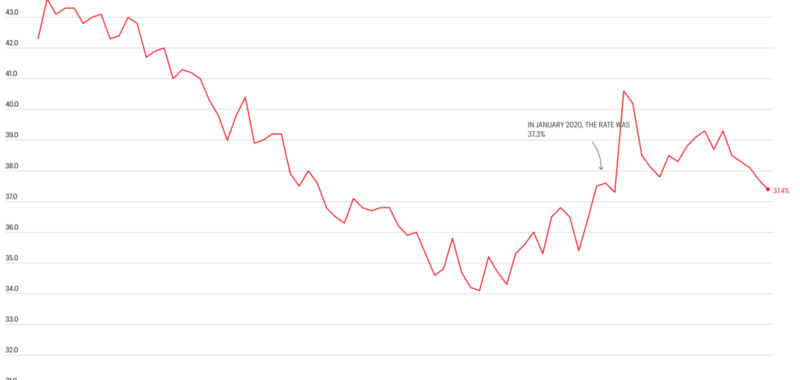
Home prices are still high, and so are mortgage rates. The kids aren’t all right.
The homeownership rate for people younger than 35 years old, who are generally younger millennials and older Gen Zers, fell to its lowest point in more than four years in the second quarter, data from the U.S. Census Bureau released yesterday shows. “Homeownership for households 35 and younger is still higher than pre-pandemic, but down from pandemic-era highs, when low mortgage rates enabled home purchasing,” a Realtor.com analysis of the data read.
The pandemic fueled a housing boom, mostly because mortgage rates were the lowest they’d ever been, but also because people could work from anywhere. Because of that, home prices skyrocketed; they’ve risen roughly 50% since the start of the pandemic. But then inflation reached a four-decade high, and the Federal Reserve raised interest rates multiple times, indirectly bumping up mortgage rates. The combo has been an affordability killer. The average 30-year fixed daily mortgage rate is currently 6.70%, and the weekly one is slightly higher. In a related manner, the Fed met today but left interest rates unchanged, at the highest they’ve been in 23 years.
Either way, in the second quarter of this year, the total homeownership rate for the country was relatively unchanged, at 65.6%. It’s lower than the rate in the early months of the pandemic, and it’s declined steadily since then. Fewer people are buying and selling homes, and last year alone, existing-home sales fell to their lowest point in close to three decades.
And they’re still depressed: In June, existing-home sales dropped 5.4% from a year earlier. (All the while, the median existing-home price topped another all-time high, at $426,900.)
So it’s no secret that the homeownership rate among younger cohorts is falling. Just consider, the salary needed to afford a starter home has almost doubled since the pandemic to almost $76,000 a year, and not to mention, million-dollar starter homes are more common than ever.
“Over the last couple of years younger buyers have suffered the brunt of climbing prices and mortgage rates more than any other group,” said the report author Hannah Jones in a statement. Jones is Realtor.com’s senior economic research analyst. “Many buyers under the age of 35 are first-time buyers and therefore do not have existing home equity to leverage into a home purchase, like many older generations do.”
She continued: “Saving for a down payment has become increasingly challenging as both rents and home prices hover near pandemic-era highs. Today’s housing market asks a lot of buyers, and younger buyers who earn lower wages, have less savings, and do not have equity in an existing home are less able to compete than older, more established buyers.”
But while the younger group saw their homeownership rate fall on a quarterly and yearly basis, some of the older generations saw theirs rise. Two groups, people between 35 and 44 years old, and those between 45 and 54 years old, saw their homeownership rate increase from the first to second quarter of the year.
There were different outcomes by income, as you might have anticipated. In the second quarter, households that made more than, or the same, as the median income saw an increase in the homeownership rate to 79.2%, from 78.8% in the first quarter of this year. However, households with incomes below the median saw their homeownership rate fall from the first quarter to the second to 52.1%. It fell from a year earlier, too. “As home prices and mortgage rates remain elevated, financing a home purchase will remain prohibitively expensive for many households, especially those earning less than the national median income,” Realtor.com said.
Still, what we do know is that things could be looking up. Home price inflation is slowing, mortgage rates are coming down, and inventory is increasing. But that isn’t to say housing will be affordable again, it just might not get worse.

